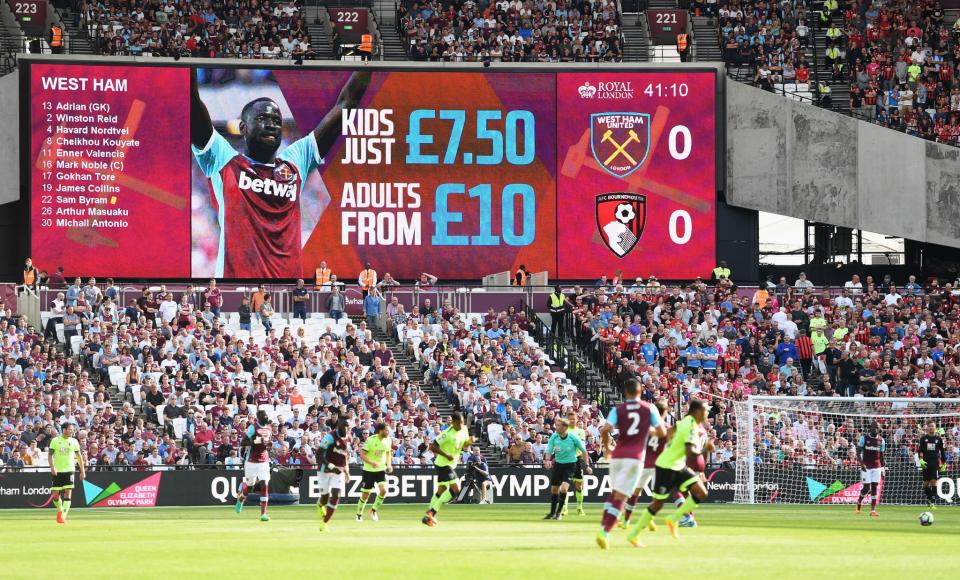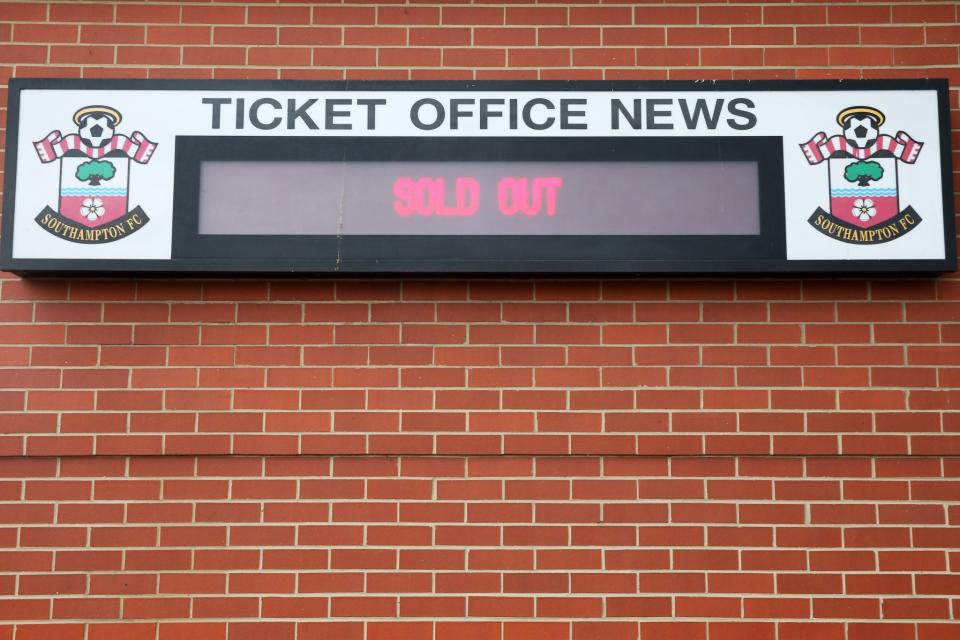Premier League: Don't believe all you read about falling ticket prices - and here's why
Two pieces of research published in the last week have claimed to reveal the real cost of watching football. Both provide interesting insights, but neither paints a complete picture.
Last week the Premier League published its conclusions from a survey conducted alongside accountancy giants EY that claimed the average price of a top-flight ticket was £31. All 20 Premier League clubs provided data on “the cost of every ticket sold or available this season” that was analysed by EY in what is claimed to be “the most comprehensive analysis of what it costs fans to attend Premier League games”.
The headline findings were that “the average price of a ticket this season is £31”, and that “over 56% of the 12.5 million tickets sold cost £30 or less”.

Also, “25% of all tickets sold are £20 or cheaper”. This would certainly, as the Premier League claims, help in “busting a few myths perpetuated about the cost of attending Premier League matches”. I thought so, and so did Nick Harris from Sporting Intelligence. So we started to examine the figures.
The most obvious question to ask is, if an average ticket is £31, and 25% cost less than £20, what is the real average? And anyone with a basic knowledge of how football pricing works knows that every club has multiple price points, membership schemes, incentive schemes and the like that mean prices quoted aren’t necessarily available across the board. So, after noticing there was no link to the quoted survey on the Premier League story, we asked for the original data.
That, we were told, would not be made available. But without that original data, it’s impossible to check the basis of the conclusions drawn. And we know that clubs and the game have a tendency to select and interpret figures that present them in a favourable light. It’s only natural they do, because their job is to present themselves in a positive light. But not publishing the original data does encourage the thought that the conclusions may not be that robust.
Nick Harris and I tried to draw our own conclusions and, unlike the Premier League, we’re happy to set our full workings out here.
The research claims 12.5m tickets have been sold this season so far. Yet attendances are on course for 13.5m. So what’s happened to the missing million tickets? They could be corporate seats, or high-end tickets lumped in with the corporates to bring the average price down.
Taking the 12.5m tickets sold as given, the report says that 25% cost £20 or less. So that’s 2.25m tickets.
56%, we’re told, are £30 or less. That means 31% must be between £20 and £30 because we know 25% are £20 or under. So that’s 3.875m tickets at between £20-£30.
The PL says 49% of tickets cost £20-£40. Now, we know from the bullet point above how many tickets cost £20-£30, and we know from the figures published in the survey that 22% of tickets cost £40-£60 and a further 4% cost over £60. So the number of tickets that cost between £30 and £40 is 2.25m.
So that’s 8.375m tickets sold for less than £40, and 6.125m at less than £30.

It’s now possible to start painting a more complete picture. The 6.125m tickets on sale at under £30 is likely to include all away tickets (capped this season at £30), any season ticket up to £570, the vast majority of concession season tickets, plus kids’ offers, early-bird deals and such like.
Most clubs in the Premier League do not sell out every game easily, so they price accordingly, as a look at the season ticket prices reveals. So they will have season tickets costing up to around £500. That accounts for most of the 8.375m tickets sold at under £40. So the 4.125m tickets sold at £40 and above are overwhelmingly sold at the clubs who can regularly sell out their grounds – that’s the so-called big clubs and the London clubs.
And that’s one reason why the clubs never let the Premier League share the data.
Let’s be clear. We’re not challenging the statement that the average price of a ticket in the Premier League is £31. What we are saying is that, on its own, that claim does not really mean anything. Here’s a simple example that shows why.
If you have 10 tickets at price point A at £10 and 39,990 at price point B at £52, the average of the price points is £31. But the average price of a ticket is £51.99. It’s all about the detail. The Premier League’s claimed global average price is not wrong, but it hides a whole host of ongoing major costs to particular large groups of fans. It’s clear that millions of tickets do fall into the £31 and under category, but there are also over 4 million – 5 million if we take the attendance figure of 13.5m – that are priced considerably higher.
To present a more accurate picture of typical and real averages, the Premier League could break down its figure for average price into non-concessionary adults and kids, and other concession categories. And then break the whole data set down by club. What that would show is that the average for an adult fan at a club such as Arsenal would be nearer £50 than £31, but it might also show that the average price for kids and concessions was much lower than £31.
The obvious way of calculating the real average price club by club is to take the total annual ticket income from the club’s annual accounts, divide that by number of tickets sold, and that’s the average price. However, clubs declare match day income, not ticket income – and that figure includes corporate hosting, programme sales, catering etc. If the clubs want to show the true, accurate price of tickets and gain kudos from headline claims, there should be no objection to greater accounting transparency.

A week after the PL research, the BBC published its now annual price of football survey. That led with the claim that “the cost of attending Premier League football has come down”. Again, the headline claim masks important detail. The BBC survey methodology has been criticised on a number of occasions since it began for simply taking each club’s quoted cheapest ticket price without contextualising or seeking verification.
I worked with Rob Freeman on a piece for the website Two Hundred Percent in 2011 which detailed some of the issues this raised, including pointing out that the £10 Watford claimed back then was their cheapest ticket price was actually the price of a ticket to Vicarage Road to see England U21 v Azerbaijan U21. The lowest price Watford charged that season for a home league game was £26. You can read the detailed analysis we did in the linked article.
Now, the BBC’s methodology has improved since the early years of the survey, one which is now eagerly awaited each year. For instance, the price of away tickets as well as home is now included. But the BBC has the resource to check club claims with the people who pay the prices in the real world – the fans themselves. This season’s survey has prompted keen investigation by Chelsea fans, for instance, of exactly where the £1 cup of tea it is claimed can be purchased at Stamford Bridge can be bought.
Not contextualising or seeking verification can lead to more serious issues, though. Hull City’s owners were quick to point out that the survey showed they have the cheapest adult season tickets in the Premier League. But, as the Hull City Supporters Trust even more quickly pointed out, “this doesn’t appear to be true”. As HCST says: “Hull City don’t even sell season tickets, since they were replaced by the controversial membership scheme in the summer. The cost per season seems to have been calculated by multiplying the monthly payment of the cheapest membership (£21) by 12, which gives the figure of £252 for the year. What the survey doesn’t say is that Hull City also have a joining fee of £84 to become a member, which means the cheapest you can really watch a season of football at Hull City for is £336. That figure makes City the fifth cheapest in the Premier League”.
Some of this may seem to be nit-picking. But when grand claims are made about pricing policies and trends, it’s not unreasonable to see if they stand up. The BBC could improve the quality of its annual pricing survey by working more closely with fan organisations to check and understand the detail of the often complex pricing structures at each club. It could then draw more accurate conclusions not subject to the spin of either clubs or fan campaign groups.
And the clubs and football authorities could be more transparent about pricing, rather than fuel suspicion by making claims that invite question because of the lack of detail and context. Football clubs are diverse and different, like the football they play. Sometimes clubs will do things we criticise, and sometimes they will pleasantly surprise us. This could be as true on pricing as it is of the football they play – if only we had the real data to see.

 Yahoo Sport
Yahoo Sport 






































